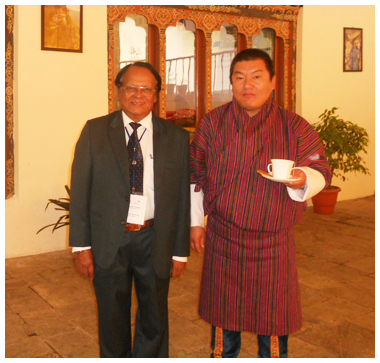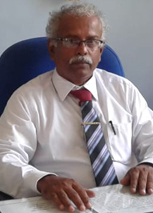Sri Lanka Ecotourism Foundation (SLEF) represented Sri Lanka at the Ecotourism Workshop in Thimpu, Bhutan.

The workshop was organized by South Asia Women's Network (SAWN) and Tourism Council of Bhutan, Thimphu, with the support of ICIMOD, Kathmandu, Nepal, through their EU-funded Himalica Programme)
The Theme of the Workshop is 'Ecotourism for Sustainable Development and Gender Empowerment in South Asia'
Sri Lanka was represented by Palitha Gurusinghe, President, Sri Lanka Ecotourism Foundation (SLEF), the National Ecotourism Society of Sri Lanka, as nominated by the SWAN, Sri Lanka Chapter
The Workshop in Thimphu on Ecotourism for Sustainable Development and Gender Empowerment in South Asia is in implementation of SWAN's Roadmap. As per the Concept Paper issued by Prof. Veena Sikri, Ambassador, Convener of South Asia Women's Network (SWAN) & Vice Chairperson South Asia Foundation (SAF-India) stated " ….for the nations of South Asia, tourism is a key industry. Tourism can play a major role in reducing poverty and in employment generation, but this must be done within an ecologically sensitive framework. Tourism is the sector where women can play the central role in its growth and development. The Thimphu Workshop seeks to discuss and develop strategies to empower women, including through livelihood opportunities, in sustainable eco-tourism in the SWAN member countries. These strategies would cover the areas of policy recommendations and advocacy (to the Governments), including for Sustainable Development Goals (SDGs) in the sector of Ecotourism, as well as leadership development among women, and capacity-building for change at all levels. SWAN believes the Workshop outcome would help SWAN to prepare a longer-term Ecotourism projects, perhaps focusing on One Identified Tourist Area in each of the nine SWAN countries…."
The Ecotourism Workshop was ceremonially inaugurated by the Minister for Agriculture and Forests, Bhutan. The Workshop was represented by all nine countries of South Asia, namely, India, Sri Lanka, Nepal, Pakistan, Afghanistan, Maldives, Myanmar, Bangladesh, Bhutan and covered wide range of subjects related to Ecotourism in South Asia.
The Presenters from all South Asian countries, presented diverse proposals and Case Studies on Gender Empowerment in South Asia through Ecotourism and Sustainable Development. Palitha Gurusinghe, in his Presentation outlined the activities performed by the women entrepreneurs in the tourism industry in Sri Lanka and also identified major areas in Ecotourism which women entrepreneurs could actively involved in gender empowerment and alleviating poverty in the tourism generating areas of Sri Lanka through Ecotourism.
The following are the excerpts from his presentation to the Workshop
Sri Lanka Women Empowerment in Tourism/Ecotourism
In Sri Lanka, a good number of women are engaged in tourism businesses in diverse capacities ranging from different categories as referred below;
Categories
• Owners of Hotels, Villas, up-market Restaurants, Travel Agencies, Ayurvedic SPAs, Tourist Souvenir shops etc. Mostly, they are the owners of family businesses which had been created to serve the mainstream tourism. They are mainly representing middle or upper middle class societies. Generally, they are educated and have capacity for investment, marketing, promotion of their products and service
• Women managing small souvenir shops such as batiks, handicrafts, eating houses, food and fruit stalls, beach vendors in the tourism generating areas of Sri Lanka, again they are mainly active in the mainstream tourism areas such as coastal areas. This category mainly belongs to middle and lower middle class
• Women, who are the members of Community Based Ecotourism Enterprises (CBEs), catering to foreign and domestic ecotourists. They assist their male counterparts (Male Community Tourism Activists) in preparation of food and beverages for the guests, guiding and interpretations, communication etc. This category represents women in remote rural areas such as protected areas, national parks, cultural sites, coastal areas which are rich in biodiversity and marine resources. It is important to uplift the living standards of these women as they are very poor and living below the accepted poverty line. Therefore, ecotourism could play a major role in reducing poverty level, creating employment opportunities etc. but this must be done within an ecologically sensitive framework.
Sri Lanka Ecotourism Foundation (SLEF), mainly focusing in empowering women belongs to the 3rd category. SLEF has already established Community Based Ecotourism Projects at Arugambay, Panama (Yala East), Ambalantota, Heeloya in Kandy with a view to empower women and in the process creating livelihood opportunities through Sustainable and Ecotourism Enterprises. Certainly, in their role, they would contribute to alleviate poverty and environmental conservation in tourism generating areas of Sri Lanka. At present, they are either managing their own small businesses or actively helping to manage the following activities initiated by the Community Based Ecotourism Projects;
• Home stay/Ecolodges
• Community Camping
• Agrotourism/Agriculture and organic farming plots
• Ayurvedha and spiritual tourism/ Indigenous Medical Practices
• Guiding and interpretation
• Open-fire cooking demonstrations
• Making Handicraft items
The income generated through CBEs is not sufficient
• However, SLEF is of the view that the income generated through the above community ecotourism projects and activities is minimal and barely sufficient to sustain the extended families.
• They live just hand to mouth. It is possible that these small scale Community Tourism Projects to be expanded in to a medium level business entity and network with similar community projects which are located in the tourism generating areas.
• It is possible to develop these projects in to a long term eco-tourism entities which would be much useful to generate much needed alternative income for the communities. This could be a 'Model' designed to empower women in the rural tourism generating areas of Sri Lanka.
How this proposed Ecotourism Project (Exclusively for Women) would function;
• This also should be a Community Based Ecotourism Enterprises (CBE, owned and manage solely by women and assisted by their family members)
• Nature of the Project; Agrotourism, Organic Farming, Creation of Farm Lodges and Ecolodges
Suggested activities which could be performed for the tourists through the Community based Agrotourism Project;
• Managing of Home stay/Ecolodges
• Community Camping
• Agrotourism/Agriculture and organic farming plots
• Ayurvedha and spiritual tourism/ Indigenous Medical Practices
• Guiding and interpretation
• Open-fire cooking demonstrations
• Making Handicraft items
• Study of traditional agricultural practices/Hydraulic Civilization of Sri Lanka
• Bird watching
• Wildlife watching
• Fishing/angling
• Trekking and hiking
• Cycling
• Canoeing and kayaking
• Conduct Heritage Cultural/Nature Tourism Programmes
• Traditional lifestyles and games
• Boating (using non-motorized water crafts)
• Promoting Voluntourism
SLEF also suggested Human Resource Development Training and Awareness Programmes on the following areas to be conducted with a view to increase the capacity building of women;
• Organizing skills
• Pubic Relation skills
• Leadership qualities
• Decision making under pressure
• New product development
• Coordination skills
• Finance handling
• Marketing/sales skills
• Communication skills
• Customer handling
• Interpersonal skills
• Innovative skills
• Eco-friendly practices
• Solid Waste management
• Micro –finance management
• Knowledge on appreciation of biodiversity and the environment
As explained before, in rural Sri Lanka 'Urban Drift' is a big problem. Rural communities whose people are living in abject poverty, invariably find their young people migrating to urban centers, because of the decline in traditional industries such as agriculture, fishing handicraft etc. Ecotourism could act as a catalyst to mitigate the above setbacks and to assure economic justification to the communities living around the protected areas, agricultural, cultural and heritage zones of Sri Lanka. Ecotourism is often seen by the poor communities as one of the few alternative livelihoods which are open to them. Ecotourism can prevent this 'urban drift' and provide the communities with an essential alternative income.
Agro Tourism Projects could be developed at regional level in South Asian countries also and create a Network among them
• South-Asia predominantly an Agricultural society. Therefore, it is easy to develop Agrotourism Projects managed by women in all South Asian Countries
• It is important to create 'Network' among those Agrotourism Projects
• Could stop 'Urban Drift' and also migrating women to Middle East countries in search of employments. The income received from the foreign employment is an indicator of poverty
Development of Agro-Ecotourism Project in Sri Lanka; what is needed?
• Funding/financing mechanism such micro financing
• Methodology/planning
• Stakeholders involved
• Marketing and promotion
• Training of the women entrepreneurs
• Management of the project
• Administration of finance/accounting
Issues and Challenges of the CBT confronts during its operations
When the CBE/CBT in tourism operations the following setbacks also to be addressed;
• Community expects immediate financial benefits
• They might try to cut down cost of tour package at the expense of providing low grade services to the visitors
• No transparency in spending money entrusted to them by the supporting organizations
• Handling funds/difficult to trust/no proper book keeping
• Burden the visitors with personal requests/money etc
• Internal disputes/rivalries among the CBE/adjoining villages.
• Personal Agendas of the Community Leader and trying his best to
support his own family, friends and relations
How to overcome the challenges
• It is essential to conduct regular training and awareness programmes, review sessions, once the Community Based Ecotourism Project has launched for the tourism business
• Make the community aware not to expect immediate financial benefits – Do your part well, first.
• No short-cuts to earn money through CBEs
• Proper understanding about 'Hospitality Skills' and 'providing quality services to the visitors'
• Proper supervision and auditing needed when providing money and materials to the CBE Regular auditing at least once in fortnight
• Importance of TEAM WORK: No individual agendas when performing Community activities
Conclusion;
The concept of above Agrotourism Community Based Ecotourism Project, solely to be owned and managed by women in Sri Lanka, has been presented to the Ecotourism Workshop in Thimpu, Bhutan by Sri Lanka Ecotourism Foundation, as highlighted in the SWAN Concept Paper on '….One Identified Tourist Area in each of the nine SWAN countries….". This Project has been included in the 'Thimpu Declaration' issued by the SWAN in September, 2014
Suggested location;
The proposed Agrotourism Project could be located preferably, in the North Central Province (NCP) as there are plenty of crown lands available and could easily be procured on a long term lease.
Funding;
Through micro credit programmes/ support from the governments, tourism establishments operating in the areas, Banks and similar financial institutions
Implementing Agency;
South Asia Women's network (SWAN), Sri Lanka Chapter
Guidelines, Training, marketing and monitoring by;
Sri Lanka Ecotourism Foundation (SLEF)
Bhutan Ecotourism Workshop- Sep-2014 image Gallery
End














